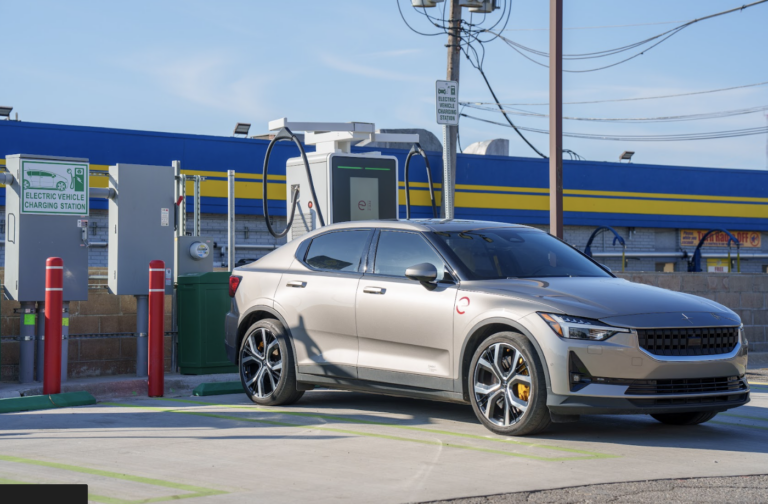
- Kim Kisner
- Business
- 08/06/2024
Red E Charging Founder Talks About Challenges in Implementation

Three years ago, under the Bipartisan Infrastructure Law, Congress allocated $5 billion in federal funding to establish the National Electric Vehicle Infrastructure (NEVI) Program. This initiative aims to develop charger networks across each state to support electric vehicles (EVs). Of this funding, $110 million was earmarked for Michigan, covering the period through fiscal year 2026. However, the state has not yet seen the installation of any new power stations.
As part of this effort, Red E Charging LLC – an EV infrastructure developer and charging network based in Detroit – has been awarded several NEVI contracts to install and manage in Michigan and a number of other states.
SBN Detroit interviewed Red E Charging Founder Abass El-Hage about the timeline, barriers, and factors specific to Michigan regarding power station installation.

Q: Since the announcement in 2021 of the $5 billion in federal funding just 11 EV stations have been installed across seven states, with none in Michigan to date. From your perspective, why is this?
A: There are several reasons.
First, this is a new process and it took time to get organized, generate RFPs, and kick it off. RFPs were published at the end of last year and contracts were awarded early this year.
Setting up the necessary paperwork is tedious and time-consuming, and around public funds, there is just a lot of due diligence required.
There are also multiple and varied requirements around bonding that can take another six months to sort out.
Identifying appropriate locations for the charging stations with the right amenities on the property that’s willing to host can be time-consuming.
On top of that, regardless of how long the paperwork takes, working with the utilities and getting the right equipment and resources in place can take six months to a year.
It’s simply an arduous process that takes time.
Q: Do the requirements vary from state to state?
A: Yes. Every state is different when it comes to execution under NEVI. In Texas and New Mexico, the NEVI process is pretty straightforward, but Texas has issues with utilities that can slow things down.
I would say Michigan is the middle of the road. And the biggest hurdle here is the strict bonding requirements. Not every state requires bonding, but Michigan requires a five-year bond that’s not run of the mill.
Q: Outside of NEVI projects, is every state different?
A: Yes. Incentives are different in every state. Utilities are different. In Michigan, we are lucky to have DTE and Consumers Energy. They have been helpful and proactive, and they facilitate a lot.
EGLE (Michigan Department of Environment, Great Lakes, and Energy) and the EPA have been helpful in Michigan as well, helping to create infrastructure in off-highway locations that are still easily accessible at reasonable rates.
Q: In Michigan, are the challenges different in the Upper Peninsula compared with the Lower Peninsula?
A: Yes. With every project there are financials, and in the UP there are fewer people, there is less traffic, and therefore less charger usage. It’s harder to justify a project when you don’t make the money back as fast.
Additionally, utilities in the Upper Peninsula impose demand charges, which are flat fees added to the electric bill. These charges can be quite substantial. When considering these costs, the financial viability of a project often becomes questionable.
Q: How do you view the transition from gas to electric vehicles being understood and received by the public?
A: It’s a mixed bag. I think there is still a stigma around charging and how difficult and inconvenient it could be. It’s a misconception in my opinion. I drive from Detroit to Chicago regularly and along that route, I can stop to charge just like stopping for gas.
Also, I think there’s been mixed messaging to the public by the auto industry – especially here in Detroit. When there are recalls, or if an automaker commits to building x amount of EVs and then scales back, this sends mixed signals to the public.
Q: How many contracts in Michigan has Red E Charging been awarded and what is the status?
A: We’ve been awarded 12 NEVI contracts all over the state and an additional 60 fast charger projects across the state for EGLE and utilities.
As I explained, the paperwork along with bonding requirements plus environmental approvals, site checks, and more make this a slow process. But we have notice to proceed and are moving forward with the first few now, so these will be underway. The actual installation takes just about two weeks.
We were also awarded a project outside of NEVI with the City of Detroit to install public-facing chargers throughout the city.
Q: Michigan aims to have enough infrastructure for 2 million EVs on the roads by 2030. Do you think this is possible?
A: Yes, I think it can happen. DTE and Consumers Energy are very helpful when it comes to single-family and multifamily homes. It’s cost-effective to have a charger at your home.
That drive from Chicago to Detroit I talked about … I think by the end of the year there will be chargers every 20 miles or so, eliminating any planning needed because people will feel confident they can stop whenever they need a charge.
I think in the near future the logistics involved in an EV experience will be no different than driving a gas-powered vehicle. It’s just a different thing fueling the car.
Be sure to subscribe to our newsletter for regular updates on sustainable business practices in and around Detroit.
Kim Kisner
- All
- Business
- Community
- Education
- Events

Unique Monique Scented Candles, a Detroit-based business founded by Monique Bounds., aims to produce candles and household products with clean ingredients and local supply chains. What began as a personal hobby during college has evolved into a full-time venture producing coconut oil and soy-based candles made with essential oils and locally sourced materials. SBN Detroit interviewed Bounds about launching a sustainable product line, sourcing challenges in Michigan, and...

Eastern Market Partnership, in collaboration with the City of Detroit’s Office of Sustainability Urban Agriculture Division, has announced $240,000 in grant funding to support Detroit-based farmers and farmer collectives. The grants will advance food access, climate education, sustainable land use, and economic opportunity, with priority given to Black- and Indigenous-led farms, youth-led initiatives, and projects rooted in historically disinvested neighborhoods. The recipients – ranging from cooperatives and community...

Citizen Robotics is a Detroit-based nonprofit that advances the use of robotics and digital manufacturing in residential construction, focusing on improving productivity, sustainability, and long-term affordability. Best known for its early work in 3D-printed housing, it explores how alternative construction methods and new financial models can reduce material waste, lower lifetime operating costs, and enhance the resilience of homes. SBN Detroit interviewed Tom Woodman, founder and president of...







